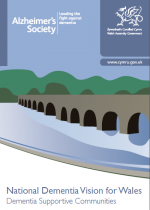News & Events
Active Lifesfyles Help Stave Off Dementia

King's College London has found that undertaking this kind of physical activity childhood helps protect the brain from the onset of dementia in your later years.
The College fund that men who undertook physical activity more than four times a week were found to have lost a 33% less of their brainpower by the age of 50 compared with those who did not exercise.
It also found that women benefitted from a 25% reduction and even those who exercised just once a week saw their mental decline lessened by 10 per cent.
For further information please read Nick McDermott's Exercising four times a week from childhood 'helps stave off dementia and increases brain power by a third' story on the Daily Mail website.
Much work has taken place in Wales recently to identify the areas that need to be addressed to improve the lives of those with and affected by dementia.
This has led to the creation of the National Dementia Vision for Wales which provides a long-term vision to ensure Wales can best meet the challenge of an increasing number of people living with dementia across the country.
In response to this need we launched a new Dementia section on this website last summer which includes links to a range of support and advice agencies and organisations and practical help such as Free Dementia Training for medical professionals.
If you have any questions about WaMH in PC's work with dementia in Wales please contact us via email at lhills@rcgp.org.uk or on 029 2050 4516.
English Health Care Stuggling With Dementia

The Care Quality Commission found dementia patients in hospital are more likely to face longer stays, be readmitted and die there while care homes are not doing enough to keep patients well.
The Commission announced the conclusions after reviewing more than 20,000 of its inspections and analysing existing data and the news spread right across the BBC after it broke yesterday.
For further information please read Nick Triggle's Health and care system 'struggling with dementia' story on the BBC
Unfortunately, dementia is not just a problem affecting England with statistics showing that just over 42,700 people currently live with dementia in Wales.
Much work has taken place in Wales recently to identify the areas that need to be addressed to improve the lives of those with and affected by dementia in the hope that situations like those highlighted by the Commission don't become the norm in our own health care system.
This has led to the creation of the National Dementia Vision for Wales which provides a long-term vision to ensure Wales can best meet the challenge of an increasing number of people living with dementia across the country.
If you have any questions about WaMH in PC's work with dementia in Wales please visit the Dementia section on this site or contact us via email at lhills@rcgp.org.uk or on 029 2050 4516.
Online Support From Action on Hearing Loss

Action on Hearing Loss is the new name for the RNID and has more than 1,000 staff, 1,092 volunteers and more than 20,000 members who support its work across the UK.
The organisation's aim is to create a world where hearing loss doesn’t limit or label people and where people value and look after their hearing and they have a resource-packed website to help support this goal.
One of its more important sections is entitled Supportng You where you can find the answers to a range of questions related to deafness and hearing loss.
This includes specific GP Support section where you will find information about the impact of undiagnosed hearing loss, how to give the best service possible to patients with hearing loss and making your surgery accessible among other things.
There is also a comprehensive Care and Support section where individuals, carers and professionals can find out about how the organisation can provide advice and support to help them find services to meet their needs.
For further information you can contact the Action on Hearing Loss Information Line via telephone at 0808 808 0123, via textphone at 0808 808 9000, via SMS at 0780 0000 360 or via email at informationline@hearingloss.org.uk.


